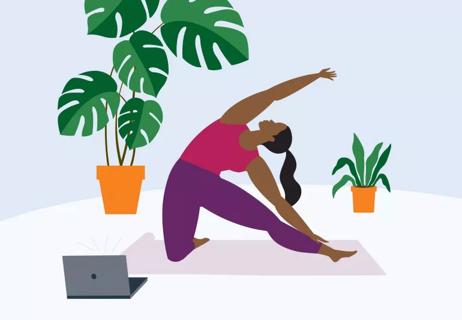An expert weighs in on the best ways to start taking care of yourself

You’ve probably heard a lot of chatter over the past few years about self-care and the importance of having a self-care routine. The idea — a holistic (whole body) approach to taking care of one’s physical and emotional health — is a great one but it can be a bit intimidating.
Advertisement
Cleveland Clinic is a non-profit academic medical center. Advertising on our site helps support our mission. We do not endorse non-Cleveland Clinic products or services. Policy
For those who’ve never done one, a self-care routine may feel like an uphill climb, something that seems impossible to do in a very busy (and chaotic) world. Others may have tried and fallen out of the routine, leaving them feeling like they just don’t have the knack for it.
The bottom line, though, is that anyone can do it. Whether you’re new to the idea or you’ve tried it before, it’s definitely doable. To get a better understanding of what a self-care routine is and how you can set yourself up for success, we spoke with psychologist Matthew Sacco, PhD.
While you might come across many definitions of what self-care is, Dr. Sacco has his own simple perspective. “Self-care is something we deliberately do — or in some instances, refrain from doing — with our own well-being in mind,” he says. “That includes anything that promotes physical, emotional, psychological or even spiritual well-being.”
Given Dr. Sacco’s relatively simple definition, it might seem that there are a lot of examples of what can pass for self-care. But he notes that there are a few specific examples that are relatively easy for anyone to follow.
When it comes to physical health, he includes the following:
Advertisement
When it comes to the psychological aspect, he says, “It’s about how you’re managing your emotional well-being. That can include relaxation techniques and even socialization.”
And for spiritual well-being, he notes that everyone has a different definition. “For some, it might include organized religion while, for others, it might be about their connection with nature. There’s a lot of leeway.”
That also includes things you can stop doing, like going on social media (which can lead to bad habits like doomscrolling). “Unplugging and going someplace you won’t be bothered can be helpful,” he adds.
Not only can self-care alleviate feelings of stress and anxiety, it better prepares you for the demands of life. Whether that’s work, family or something else, you’re only able to help those around you when you’ve taken proper care of yourself.
“Again, it’s about being deliberate,” says Dr. Sacco. “It’s participating in activities that you value. It doesn’t have to be overly complicated. It’s just that planned intentional aspect that you look at it for promoting your well-being.”
“Doing this kind of work thoughtfully, in a very planned way, is absolutely a vital part of being more effective in the world around us,” he adds.
If you’re wondering where to start, look for something that you’ve always wanted to do or maybe something you feel you need to do, like an exercise routine. And when you start, says Dr. Sacco, do so with very clear goals in mind, following the S-M-A-R-T concept:
He also suggests looking at replacing current routines or behaviors with better ones. “Maybe it’s replacing a habit or routine you’d like to change, like eating healthier snacks,” he says. “Look at those things at first, things that are simpler to do, and build momentum for larger things off that success.”
The best way to think about self-care activities, Dr. Sacco says, is in layers. “Practicing self-care every day is important,” he notes. “Daily activities should be different than activities you do weekly, monthly and even yearly.”
Think of it like this, he advises, start with your daily self-care routine like meditating, a bath or a form of exercise. Next, focus on something you can do weekly, like catching up on a favorite television show or exercise class. Then, be sure you’re doing something on a slightly bigger scale once a month, like going out with friends or a spa day. Then, set a goal to do something big each year, like a vacation.
Advertisement
Those layers provide both short-term and long-term goals to keep you motivated while also providing those rewarding self-care experiences regularly.
Over the years, the idea that it takes doing something for 21 days to establish it as a routine has taken hold. But, says Dr. Sacco, that’s incorrect; that number was taken out of context from an old study. The truth is a bit longer.
“According to more recent research, it can take between around 18 to 250 days to develop a habit with the average being around 66 days,” he says. “But that’s not a one-size-fits-all number. It can vary from person to person and some habits are easier to start than others.”
It’s important to remember that your own pace can ebb and flow as you try to establish these routines and not to get too stressed if you hit a rough patch or a lapse. After all, these are routines that should make your life less stressful.
“Lapses are going to happen,” says Dr. Sacco. “So it’s really important to be forgiving of yourself when it happens.” Those lapses can be for any number of reasons: a change to your schedule, other priorities or demands of your time or sometimes just giving yourself a break.
Whatever the case is for you, Dr. Sacco stresses that it’s important to adapt to a new routine instead of giving up. “Adapt to your new circumstances, reprioritize things and figure out that new routine. Sometimes you have to adjust along the way.”
Advertisement
The bottom line is that your self-care routine is something deliberate and important to you that can provide a refreshed sense of self. “You have to know yourself because what may work for you, like a spa day, may not work for someone else,” he says. “High levels of self-awareness and flexibility can really improve this process and understanding what is meaningful to you.”
Advertisement
Learn more about our editorial process.
Advertisement

A little research can go a long way — but only if you keep your mind open and your provider informed

Move your body, spend time with other adults and practice gratitude to help regain your sense of self

Like being your own best friend in times of trouble, self-love is an act of self-preservation

This state of mind is all about focusing on what you love and enjoy (minus the FOMO)

Silence your inner critic by treating yourself with kindness, understanding and empathy

You may need a mental shift to start caring for your physical and mental well-being

Take time to prioritize yourself, even (especially) when you’re consumed with prioritizing others

Being occasionally self-indulgent has mental and physical benefits

Wearing a scarf, adjusting your outdoor activities and following your asthma treatment plan can help limit breathing problems

Your diet in the weeks, days and hours ahead of your race can power you to the finish line

When someone guilt trips you, they’re using emotionally manipulative behavior to try to get you to act a certain way